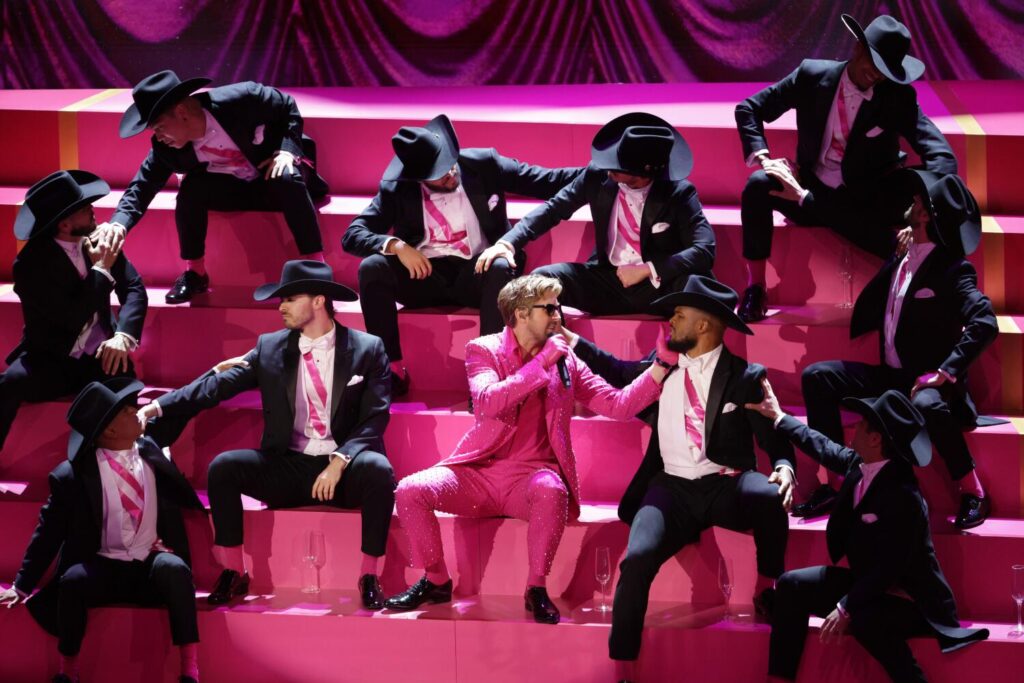Eight months ago, on an otherwise quiet July weekend, two films — Greta Gerwig’s “Barbie” and Christopher Nolan’s “Oppenheimer” — shared a release date and together, as Barbenheimer, became the cinematic event and cultural phenomenon of the summer. They seemingly set the stage for a pink-filled, explosive awards season.
But the recognition for the unlikely twins was hardly identical. While “Oppenheimer” pulled in 13 Oscar nominations, “Barbie” earned just eight.
While saluting the stunt community at Sunday’s ceremony, “Barbie’s” Ryan Gosling and “Oppenheimer’s” Emily Blunt — each nominated for their supporting roles in their respective films — playfully acknowledged the faceoff.
“I’m just happy we can finally put this Barbenheimer rivalry behind us,” Gosling told Blunt as they took the stage.
Continuing the bit, Blunt kept it blunt: “That’s right — it’s Ken and Kitty, just leaving all that fodder in the dust. And the way this award season’s turned out, it wasn’t much of a rivalry. So, just let it go.”
“It’s true, you guys are doing very well, congratulations,” Gosling said, channeling his character’s finesse with a burn. “But, you know, I think I figured out why they called it Barbenheimer, and they didn’t call it Oppenbarbie. … I think you guys are at the tail end of that, because you were riding ‘Barbie’s’ coattails all summer.”
Behind every joke, there is some truth. In the end, Barbie won one of its eight nominations — original song. “Oppenheimer” won seven of its 13, including best picture, lead actor for Cillian Murphy and director for Chrisopher Nolan — his first win.
“What Was I Made For?,” music and lyric by Billie Eilish and Finneas O’Connell, took home the sole trophy for “Barbie.”
“I’m so grateful for this song, and this movie and the way it made me feel. This goes out to everyone who was affected by this movie and how incredible it is,” Eilish said from the stage.
But it wasn’t the haul many might have expected for a critically acclaimed, history-making blockbuster.
“I hadn’t expected [‘Barbie’] to plummet as a contender so clearly and so quickly early on,” said Stephen Galloway, dean of Chapman University’s film school. “Usually, it takes longer. There’s room for surprises.”
The film, starring Margot Robbie as the iconic blond plastic doll, saved the summer box office, becoming the highest-grossing film of the year with $636 million in North America and $1.4 billion globally to date. The impressive receipts also came with frenzied buzz, boosted by a dizzying amount of marketing tie-ins and Robbie’s impressive press-tour fashions inspired by actual looks worn by the famous doll over the years.
After months of living in a Barbie world, the academy rewarded the film with a more-than-respectable eight Oscar nominations, including for best picture. Two of its actors were nominated in supporting categories: Gosling, as Ken, and America Ferrera as Gloria, a frustrated working mom whose very human complications set off a crisis in Barbieland. Songs “I’m Just Ken” and “What Was I Made For?” made the original song category. It also was nominated for its costume and production design, and for its screenplay, by Gerwig and Noah Baumbach.
But the conversation on nominations morning in January was dominated instead by what “Barbie” wasn’t nominated for. Gerwig was left off the directing list, and Robbie, the titular star, who also executive produced the film, wasn’t nominated for lead actress. Numerous observers pointed out that these snubs reflected the same problems the film identified in the broader culture.
“The popular vote is never a guarantee of the establishment vote,” Galloway said. “In fact, the establishment has always been wary for them. If you look back at films that have emerged as classics, the most important of all time — Spielberg’s early films: ‘Jaws,’ ‘Close Encounters,’ ‘E.T,’ has he ever made better films? Not from my point of view, but they were not the ones that got awards. ‘Star Wars,’ which has probably influenced more of my students than any other film in history, no one even considered a serious contender for best picture. There’s always been a bit of a clash. And let’s face it, the establishment never recognized the avant-garde.”
Of course, “Oppenheimer,” a rare mix of box office clout and prestige, made for formidable competition. The film grossed nearly $1 billion worldwide and had all the makings of an Oscar darling: It was helmed by a long-admired director, tackled cerebral material in a serious manner and boasted a star-studded cast that included Cillian Murphy, Robert Downey Jr. and Blunt.
It also came into the night on Sunday with plenty of hardware, including wins from the predictive trifecta of the Screen Actors Guild, the Directors Guild of America and the Producers Guild of America, as well as the Golden Globes and BAFTAs. “Barbie,” by contrast, was largely shut out at those major awards.
“Barbie’s” performance at the Oscars — or underperformance, as some might argue — highlights the motion picture academy’s ongoing struggle to balance the voting preferences of its members with the tastes of the filmgoing (and awards-show-watching) public.
Just as film studios have largely shifted toward tentpole and franchise fare in their output, the Oscar nominations have increasingly highlighted indie and international films. The pandemic underscored this evolution, with little-seen best picture winners “CODA” and “Nomadland” primarily distributed via streaming services. In turn, many have theorized that a lack of nominees and winners like box office behemoth “Titanic,” which took home best picture and 10 other Academy Awards during the highest-rated telecast ever in 1998, have contributed to the Oscars’ declining viewership.
In 2018, the organization even considered establishing a “popular film” category to bring blockbuster-type movies into the broadcast but quickly shelved the idea. The Golden Globes introduced such a category this year.
Its first winner? “Barbie.”

